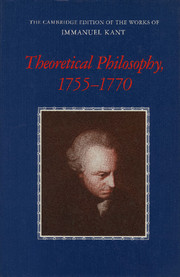Book contents
- Frontmatter
- Contents
- General editors' preface
- Preface
- Guide to abbreviations
- General introduction
- Introductions to the translations
- Résumés of the works
- A NEW ELUCIDATION OF THE FIRST PRINCIPLES OF METAPHYSICAL COGNITION (1755)
- THE EMPLOYMENT IN NATURAL PHILOSOPHY OF METAPHYSICS COMBINED WITH GEOMETRY, OF WHICH SAMPLE I CONTAINS THE PHYSICAL MONADOLOGY (1756)
- AN ATTEMPT AT SOME REFLECTIONS ON OPTIMISM (1759)
- THE FALSE SUBTLETY OF THE FOUR SYLLOGISTIC FIGURES (1762)
- THE ONLY POSSIBLE ARGUMENT IN SUPPORT OF A DEMONSTRATION OF THE EXISTENCE OF GOD (1763)
- ATTEMPT TO INTRODUCE THE CONCEPT OF NEGATIVE MAGNITUDES INTO PHILOSOPHY (1763)
- INQUIRY CONCERNING THE DISTINCTNESS OF THE PRINCIPLES OF NATURAL THEOLOGY AND MORALITY (1764)
- Introduction
- First reflection General comparison of the manner in which certainty is attained in mathematical cognition with the manner in which certainty is attained in philosophical cognition
- Second reflection The only method for attaining the highest possible degree of certainty in metaphysics
- Third reflection On the nature of metaphysical certainty
- Fourth reflection Concerning the distinctness and certainty of which the fundamental principles of natural theology and morality are capable
- Appendix Abridgement of Moses Mendelssohn's prize-winning essay
- M. IMMANUEL KANT'S ANNOUNCEMENT OF THE PROGRAMME OF HIS LECTURES FOR THE WINTER SEMESTER 1765 — 1766 (1765)
- DREAMS OF A SPIRIT-SEER ELUCIDATED BY DREAMS OF METAPHYSICS (1766)
- CONCERNING THE ULTIMATE GROUND OF THE DIFFERENTIATION OF DIRECTIONS IN SPACE (1768)
- ON THE FORM AND PRINCIPLES OF THE SENSIBLE AND THE INTELLIGIBLE WORLD [INAUGURAL DISSERTATION] (1770)
- Factual notes
- Bibliographies of editions and translations
- Glossary
- Biographical-bibliographical sketches of persons mentioned by Kant
- Index
Introduction
Published online by Cambridge University Press: 18 December 2014
- Frontmatter
- Contents
- General editors' preface
- Preface
- Guide to abbreviations
- General introduction
- Introductions to the translations
- Résumés of the works
- A NEW ELUCIDATION OF THE FIRST PRINCIPLES OF METAPHYSICAL COGNITION (1755)
- THE EMPLOYMENT IN NATURAL PHILOSOPHY OF METAPHYSICS COMBINED WITH GEOMETRY, OF WHICH SAMPLE I CONTAINS THE PHYSICAL MONADOLOGY (1756)
- AN ATTEMPT AT SOME REFLECTIONS ON OPTIMISM (1759)
- THE FALSE SUBTLETY OF THE FOUR SYLLOGISTIC FIGURES (1762)
- THE ONLY POSSIBLE ARGUMENT IN SUPPORT OF A DEMONSTRATION OF THE EXISTENCE OF GOD (1763)
- ATTEMPT TO INTRODUCE THE CONCEPT OF NEGATIVE MAGNITUDES INTO PHILOSOPHY (1763)
- INQUIRY CONCERNING THE DISTINCTNESS OF THE PRINCIPLES OF NATURAL THEOLOGY AND MORALITY (1764)
- Introduction
- First reflection General comparison of the manner in which certainty is attained in mathematical cognition with the manner in which certainty is attained in philosophical cognition
- Second reflection The only method for attaining the highest possible degree of certainty in metaphysics
- Third reflection On the nature of metaphysical certainty
- Fourth reflection Concerning the distinctness and certainty of which the fundamental principles of natural theology and morality are capable
- Appendix Abridgement of Moses Mendelssohn's prize-winning essay
- M. IMMANUEL KANT'S ANNOUNCEMENT OF THE PROGRAMME OF HIS LECTURES FOR THE WINTER SEMESTER 1765 — 1766 (1765)
- DREAMS OF A SPIRIT-SEER ELUCIDATED BY DREAMS OF METAPHYSICS (1766)
- CONCERNING THE ULTIMATE GROUND OF THE DIFFERENTIATION OF DIRECTIONS IN SPACE (1768)
- ON THE FORM AND PRINCIPLES OF THE SENSIBLE AND THE INTELLIGIBLE WORLD [INAUGURAL DISSERTATION] (1770)
- Factual notes
- Bibliographies of editions and translations
- Glossary
- Biographical-bibliographical sketches of persons mentioned by Kant
- Index
Summary
The question proposed for consideration is such that, if it is appropriately answered, higher philosophy must as a result acquire a determinate form. If the method for attaining the highest possible degree of certainty in this type of cognition has been established, and if the nature of this kind of conviction has been properly understood, then the following effect will be produced: the endless instability of opinions and scholarly sects will be replaced by an immutable rule which will govern didactic method and unite reflective minds in a single effort. It was in this way that, in natural science, Newton's method transformed the chaos of physical hypotheses into a secure procedure based on experience and geometry. But what method is this treatise itself to adopt, granted that it is a treatise in which metaphysics is to be shown the true degree of certainty to which it may aspire, as well as the path by which the certainty may be attained? If what is presented in this treatise is itself metaphysics, then the judgement of the treatise will be no more certain than has been that science which hopes to benefit from our inquiry by acquiring some permanence and stability; and then all our efforts will have been in vain. I shall, therefore, ensure that my treatise contains nothing but empirical propositions which are certain, and the inferences which are drawn immediately from them. I shall rely neither on the doctrines of the philosophers, the uncertainty of which is the very occasion of this present inquiry, nor on definitions, which so often lead to error. The method I shall employ will be simple and cautious. Some of the things I shall have to say may be found to be lacking in certainty; but such things will only have an elucidatory function and will not be employed for purposes of proof.
- Type
- Chapter
- Information
- Theoretical Philosophy, 1755–1770 , pp. 247Publisher: Cambridge University PressPrint publication year: 1992



